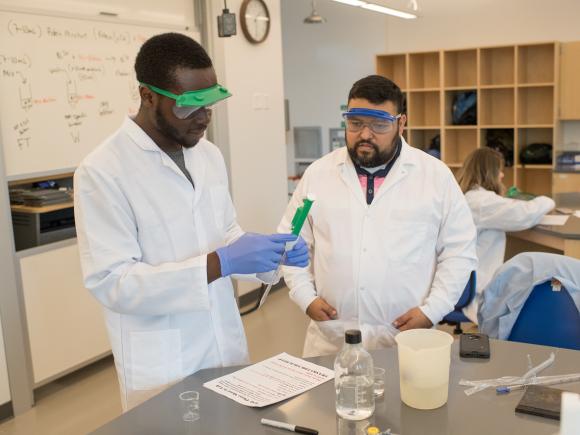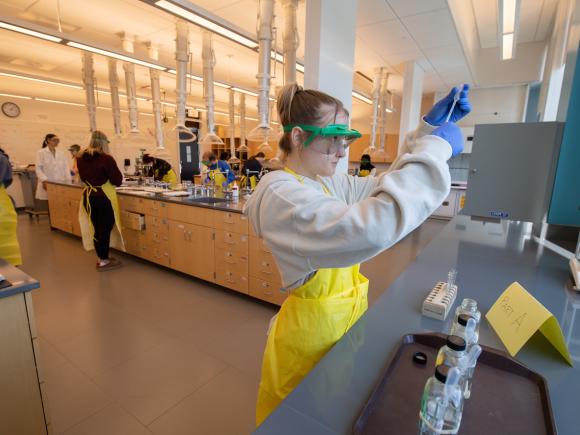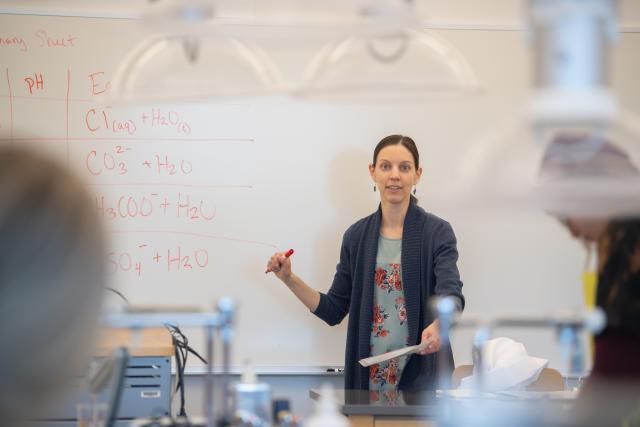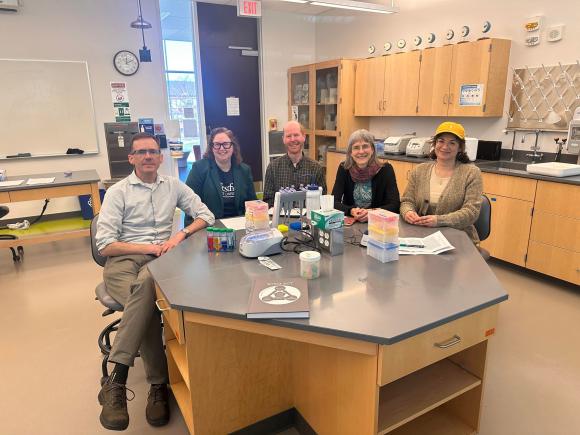Choose the Chemistry Teaching Licensure program at Westfield State University to start your journey towards becoming a chemistry teacher in Massachusetts. Our comprehensive curriculum equips you with the knowledge and skills needed to excel in the classroom. Upon graduation, you'll be fully prepared for recommendation to the Massachusetts Department of Education for Initial Licensure in Chemistry, ensuring you're ready to make a meaningful impact on the next generation of learners.
Chemistry, Teacher Licensure, B.S.
Explore the Path to Chemistry Teaching Licensure
Program Highlights
- Teaching Methods course prepares you for practicum in schools
- You will learn chemistry in a welcoming community
- Everyone conducts their own research project supervised by faculty
Ready to Inspire Future Scientists?
Discover the opportunities awaiting you in our Chemistry Teaching Licensure program.
Develop Essential Lab Skills and Chemical Understanding for Teaching
-

Comprehensive Preparation
Our Chemistry Teaching Licensure program equips you with the knowledge and skills needed to excel as a chemistry teacher in Massachusetts, ensuring you're fully prepared for Initial Licensure in Chemistry.
-

Experienced Faculty
Benefit from the guidance of experienced faculty who are dedicated to your success. Receive personalized support and mentorship as you navigate your journey towards becoming a licensed chemistry educator.
-

Hands-On Learning
Engage in hands-on learning experiences including labs and student teaching practicums. Gain practical experience and confidence in the classroom, setting you up for a successful teaching career.
Program Details
Learning Outcomes
Students will have demonstrated the ability to:
- Recognize and apply the big ideas of chemistry (https://doi.org/10.1021/ed300049w) while learning about inorganic, organic, analytical, physical, and biochemistry.
- Plan, conduct, and document experiments, analyze data, and interpret results, in a safe and ethical manner using chemical methods and instruments.
- Write reports and present the results of their own experiments and of published work to their peers and their instructors.
- Evaluate and solve chemical problems using conceptual and quantitative approaches.
What Can You Do with a Chemistry, Teacher Licensure, B.S.?
With a Chemistry, Teacher Licensure, B.S., you can pursue a rewarding career as a chemistry teacher in Massachusetts, working at the high school level. Graduates of this program are equipped to:
- Teach Chemistry
- Educational Leadership
- Science Education Advocacy
- Pursue Advanced Education
- Engage in Outreach and Mentoring

Ready to learn more?
Course Requirements
Get a Great Education with 1:1 Access to Faculty
We offer high-quality academics, unique learning opportunities, and a gorgeous campus—and we have interactive classes, accessible faculty, and one-on-one support.
You'll join fellow motivated students ready to make the most of the college experience through active participation. Become part of a caring and committed community that understands and embraces the bridge between academic study and human interactions.
-
100%
OF FULL-TIME FACULTY HAVE A PHD
-
Massachusetts needs more licensed chemistry teachers
-
Westfield offers STEM-ACT stipends for year 3 and 4
Learn from Those Who Love Science, and Love to Teach
Representing the disciplines of organic chemistry, analytical chemistry, geochemistry, biochemistry, and biophysics—as well as chemistry education—our faculty bring a wealth of knowledge to the classroom and to the lab. Their focus is on helping you to achieve established learning outcomes as they support and guide you through our rigorous curriculum.

Frequently Asked Questions
Is Westfield State University accredited?
Westfield State University is accredited by the New England Commission of Higher Education (NECHE). Our educator preparation programs are also approved by the Massachusetts Department of Elementary and Secondary Education (DESE) and accredited by the Association for Advancing Quality in Educator Preparation (AAQEP).
Do I have to submit SAT/ACT scores or an essay when I apply?
Westfield State University does not require an application essay, SAT and/or ACT scores, or letters of recommendation (except for special program admissions).
All first-year applicants are reviewed for admission based on their high school record. First-year applicants must meet the minimum eligibility requirements established by the Massachusetts Department of Higher Education (DHE) in order to qualify for admission to a state university.
Learn more about the application process and admissions here.
How much does Westfield State University cost?
Westfield State University offers a comprehensive university experience at an affordable cost—with many options for financial aid. Visit our Cost and Aid page to learn more.
Will I receive academic support?
We’re invested in your success. Whether you need a little help adjusting to college, study strategies, tutoring, or Student Accessibility Services, the academic support team is ready to help. Our mission is to provide you with the tools to explore academic opportunities as well as to plot strategies for continued growth.
Learn more about our student support services here.
What scholarships are available?
STEM-ACT is a program that provides scholarship support for Westfield State University STEM (Biology, Chemistry, General Science, or Mathematics) secondary education students that are passionate about social justice and advancing STEM education. Students are encouraged to apply in their sophomore year to be admitted to the program for their junior and senior years.
Related Programs
Request Information
We’re here to answer your questions and deliver the support you need along your academic journey. Please provide your contact information and area of interest, and we’ll be in touch shortly.


